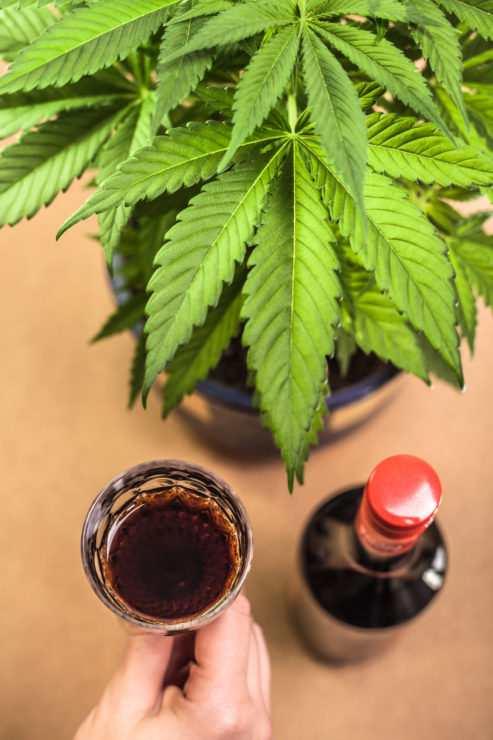 This past year, the country has witnessed widespread interest in the use of cannabis in its nutraceutical (when added to food or drinks) form. Cannabidiol (“CBD”), the non-psychoactive chemical compound found in the cannabis plant, has gained great popularity among alcohol beverage companies. The growing popularity of CBD-infused products combined with their mainstream nature has given alcohol beverage companies the false impression that blending CBD into their products is an easy process. This post bursts the myth by highlighting the regulatory labyrinth into which alcohol beverage manufacturers must venture to enter this growing, popular market.
This past year, the country has witnessed widespread interest in the use of cannabis in its nutraceutical (when added to food or drinks) form. Cannabidiol (“CBD”), the non-psychoactive chemical compound found in the cannabis plant, has gained great popularity among alcohol beverage companies. The growing popularity of CBD-infused products combined with their mainstream nature has given alcohol beverage companies the false impression that blending CBD into their products is an easy process. This post bursts the myth by highlighting the regulatory labyrinth into which alcohol beverage manufacturers must venture to enter this growing, popular market.
Alcoholic beverages are regulated by federal and state law. Consequently, beer, wine and spirits producers are generally accustomed to navigating rules, various forms of licensure, and modes of compliance related to their industry. Their familiarity with comprehensive regulations makes alcohol beverage companies well equipped to navigate the intersection between alcohol and cannabis, which is heavily regulated at the state level.
Unlike alcohol, though, many forms of cannabis are strictly federally prohibited. As such, “marijuana” and “tetrahydrocannabinols” (THC) are listed on Schedule I of the Controlled Substances Act (“CSA”). The CSA defines “marijuana” as:
“all parts of the Cannabis sativa L. plant whether growing or not; the seeds thereof; the resin extracted from any part of such plant; and every compound, manufacture, salt, derivative, mixture, or preparation of such plant, its seeds or resin.”
The CSA exempts certain parts of the cannabis plant from the definition of marijuana, including hemp-derived CBD products that are manufactured with hemp grown as part of a Farm Bill-authorized state pilot program. Accordingly, only CBD derived from industrial hemp (“Hemp” or “Hemp-CBD”) is allowed in the formulation of CBD-infused alcoholic beverages.
The U.S. Alcohol and Tobacco and Trade Bureau (“TTB”)’s 2000 Hemp Policy (the “Policy”) dictates how manufacturers may use Hemp-CBD in their alcohol products. The Policy sets forth the requirements for formulas and statements of process producers may use. Although the TTB permits the use of Hemp derivatives in alcohol products, the federal agency strictly prohibits producers from using “depictions, graphics, designs, devices, puffery, statements, slang, representations, etc. implying or referencing the presence of hemp, marijuana, and other controlled substance; or any psychoactive effects.” In other words, producers should refrain from using the term “CBD” in their formula or statement of process as the TTB seems to interpret the term as unlawful under federal law.
In addition to submitting the list of ingredients and the method of manufacture they intend to use, producers must provide the TTB with an analysis conducted by a U.S. lab of the hemp components that will be used in the product. A detailed description of the method employed by the U.S. lab must also be presented to the TTB.
The TTB will approve the formula or statement of process if the finished product does not contain a controlled substance. Once the hemp components have been tested for controlled substances, producers must ensure that detailed records are kept at the manufacturing premises for inspections, which we hear may occur as early as within the first month of production.
Once a producer receives TTB approval, which may take up to two years, the producer must then comply with state rules and regulations. In Oregon, for example, manufacturers must provide proof to the Oregon Liquor Control Commission (“OLCC”) that they have met the TTB formula requirement and meet the OLCC labeling requirements before they can manufacture and sell the infused beverage in the state. Oregon beverage producers who intend to sell their infused product outside of Oregon must also show the OLCC that they comply with the TTB labeling requirements. As this post underlines, obtaining approval for the manufacture and sale of hemp-CBD infused alcoholic beverages is a complex process, due primarily to the uncertain nature of hemp-CBD laws.























